Analysis of Business Communication Skills: Literature Review Report
VerifiedAdded on 2022/12/27
|10
|2844
|61
Report
AI Summary
This report provides a detailed analysis of business communication skills, focusing on the gap between skills acquired during graduation and those required in the workplace. It draws from an extensive literature review, examining the expectations of employers and the importance of soft skills, peer assessment, and skill development. The report highlights the mismatch between graduate skills and industry needs, discussing factors influencing employability and strategies for improvement. It also explores the role of technology, such as computer-based simulations, in enhancing teaching and learning methodologies. The analysis emphasizes the significance of integrating graduate attributes into the curriculum and the need for a balance between technical and business skills. The report concludes by underscoring the importance of effective communication and its impact on graduate employability.
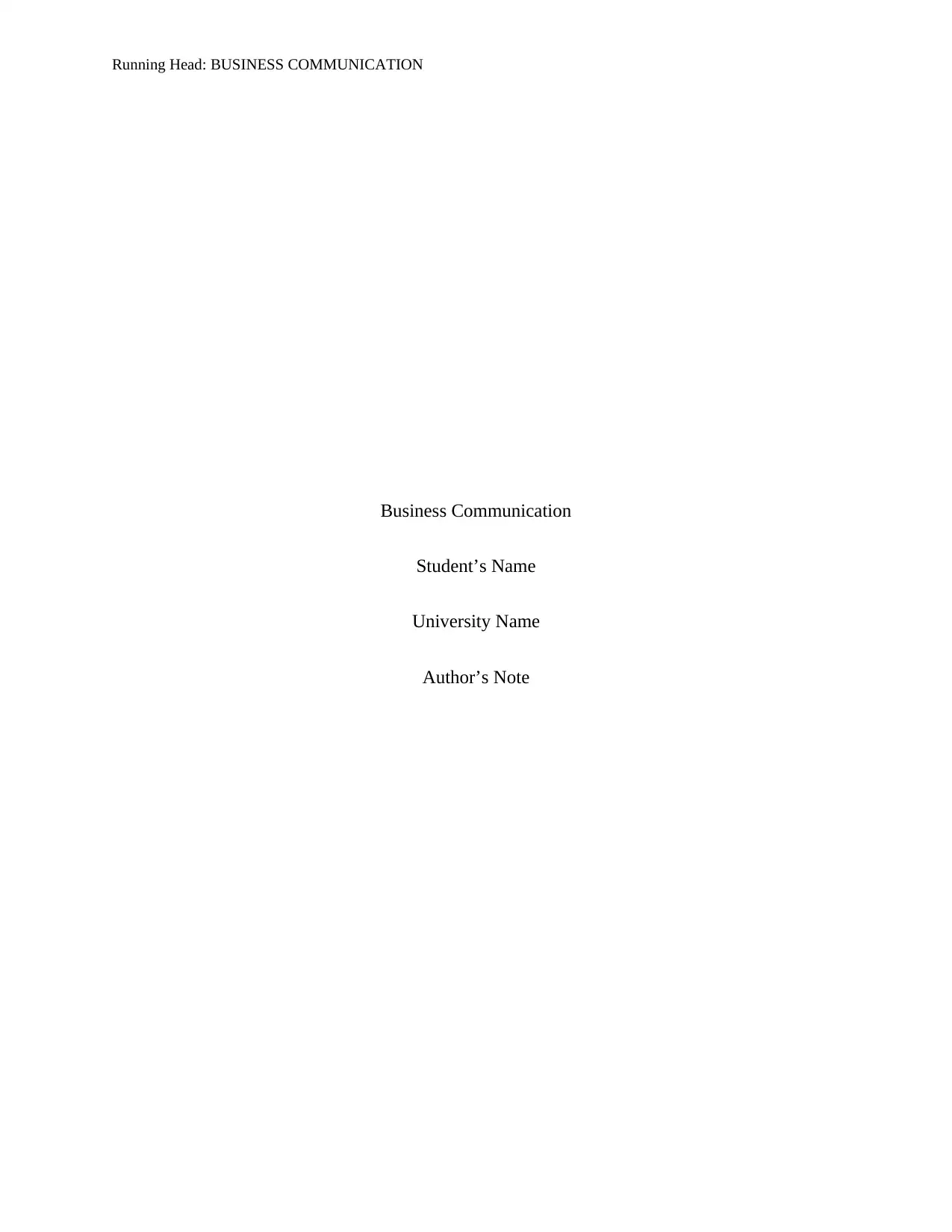
Running Head: BUSINESS COMMUNICATION
Business Communication
Student’s Name
University Name
Author’s Note
Business Communication
Student’s Name
University Name
Author’s Note
Paraphrase This Document
Need a fresh take? Get an instant paraphrase of this document with our AI Paraphraser
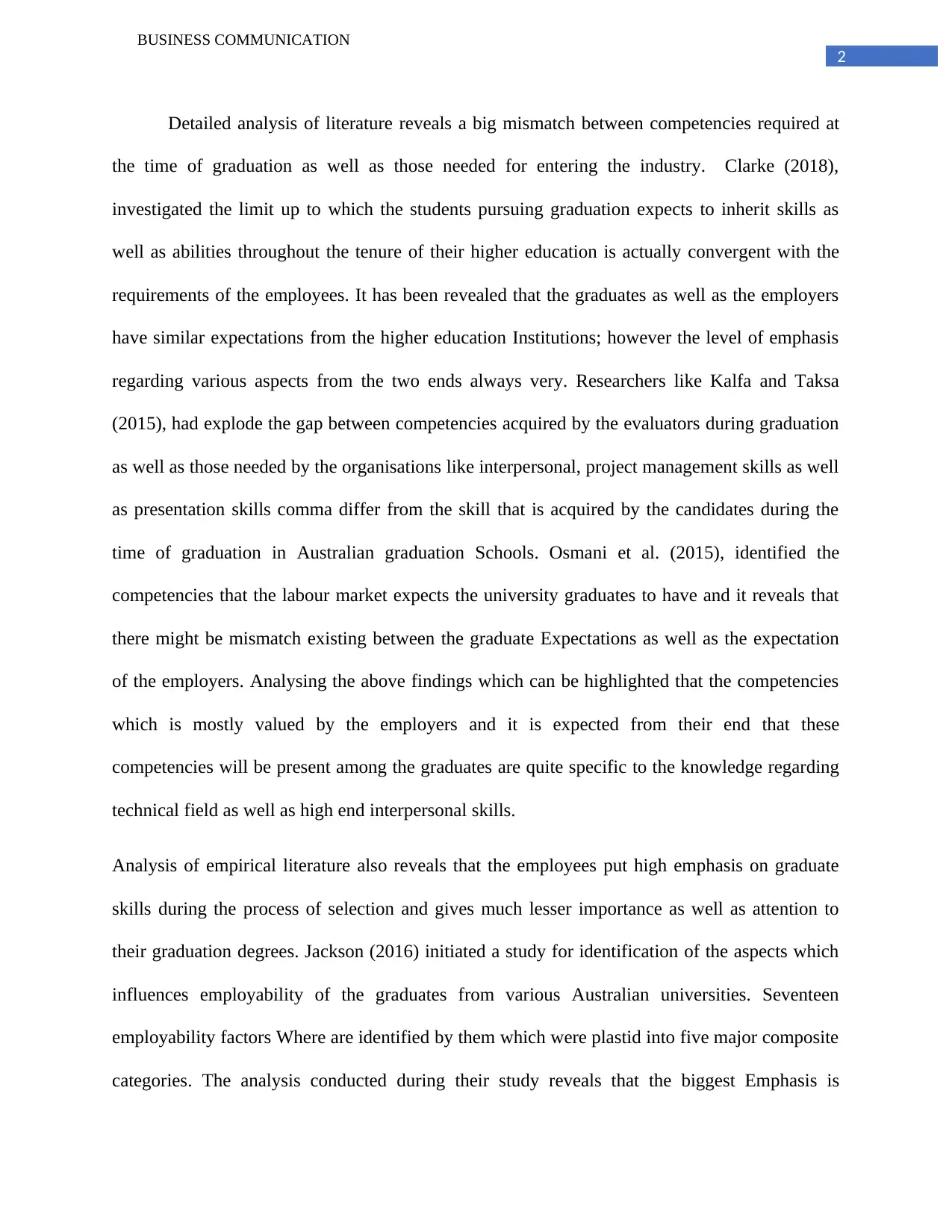
2
BUSINESS COMMUNICATION
Detailed analysis of literature reveals a big mismatch between competencies required at
the time of graduation as well as those needed for entering the industry. Clarke (2018),
investigated the limit up to which the students pursuing graduation expects to inherit skills as
well as abilities throughout the tenure of their higher education is actually convergent with the
requirements of the employees. It has been revealed that the graduates as well as the employers
have similar expectations from the higher education Institutions; however the level of emphasis
regarding various aspects from the two ends always very. Researchers like Kalfa and Taksa
(2015), had explode the gap between competencies acquired by the evaluators during graduation
as well as those needed by the organisations like interpersonal, project management skills as well
as presentation skills comma differ from the skill that is acquired by the candidates during the
time of graduation in Australian graduation Schools. Osmani et al. (2015), identified the
competencies that the labour market expects the university graduates to have and it reveals that
there might be mismatch existing between the graduate Expectations as well as the expectation
of the employers. Analysing the above findings which can be highlighted that the competencies
which is mostly valued by the employers and it is expected from their end that these
competencies will be present among the graduates are quite specific to the knowledge regarding
technical field as well as high end interpersonal skills.
Analysis of empirical literature also reveals that the employees put high emphasis on graduate
skills during the process of selection and gives much lesser importance as well as attention to
their graduation degrees. Jackson (2016) initiated a study for identification of the aspects which
influences employability of the graduates from various Australian universities. Seventeen
employability factors Where are identified by them which were plastid into five major composite
categories. The analysis conducted during their study reveals that the biggest Emphasis is
BUSINESS COMMUNICATION
Detailed analysis of literature reveals a big mismatch between competencies required at
the time of graduation as well as those needed for entering the industry. Clarke (2018),
investigated the limit up to which the students pursuing graduation expects to inherit skills as
well as abilities throughout the tenure of their higher education is actually convergent with the
requirements of the employees. It has been revealed that the graduates as well as the employers
have similar expectations from the higher education Institutions; however the level of emphasis
regarding various aspects from the two ends always very. Researchers like Kalfa and Taksa
(2015), had explode the gap between competencies acquired by the evaluators during graduation
as well as those needed by the organisations like interpersonal, project management skills as well
as presentation skills comma differ from the skill that is acquired by the candidates during the
time of graduation in Australian graduation Schools. Osmani et al. (2015), identified the
competencies that the labour market expects the university graduates to have and it reveals that
there might be mismatch existing between the graduate Expectations as well as the expectation
of the employers. Analysing the above findings which can be highlighted that the competencies
which is mostly valued by the employers and it is expected from their end that these
competencies will be present among the graduates are quite specific to the knowledge regarding
technical field as well as high end interpersonal skills.
Analysis of empirical literature also reveals that the employees put high emphasis on graduate
skills during the process of selection and gives much lesser importance as well as attention to
their graduation degrees. Jackson (2016) initiated a study for identification of the aspects which
influences employability of the graduates from various Australian universities. Seventeen
employability factors Where are identified by them which were plastid into five major composite
categories. The analysis conducted during their study reveals that the biggest Emphasis is
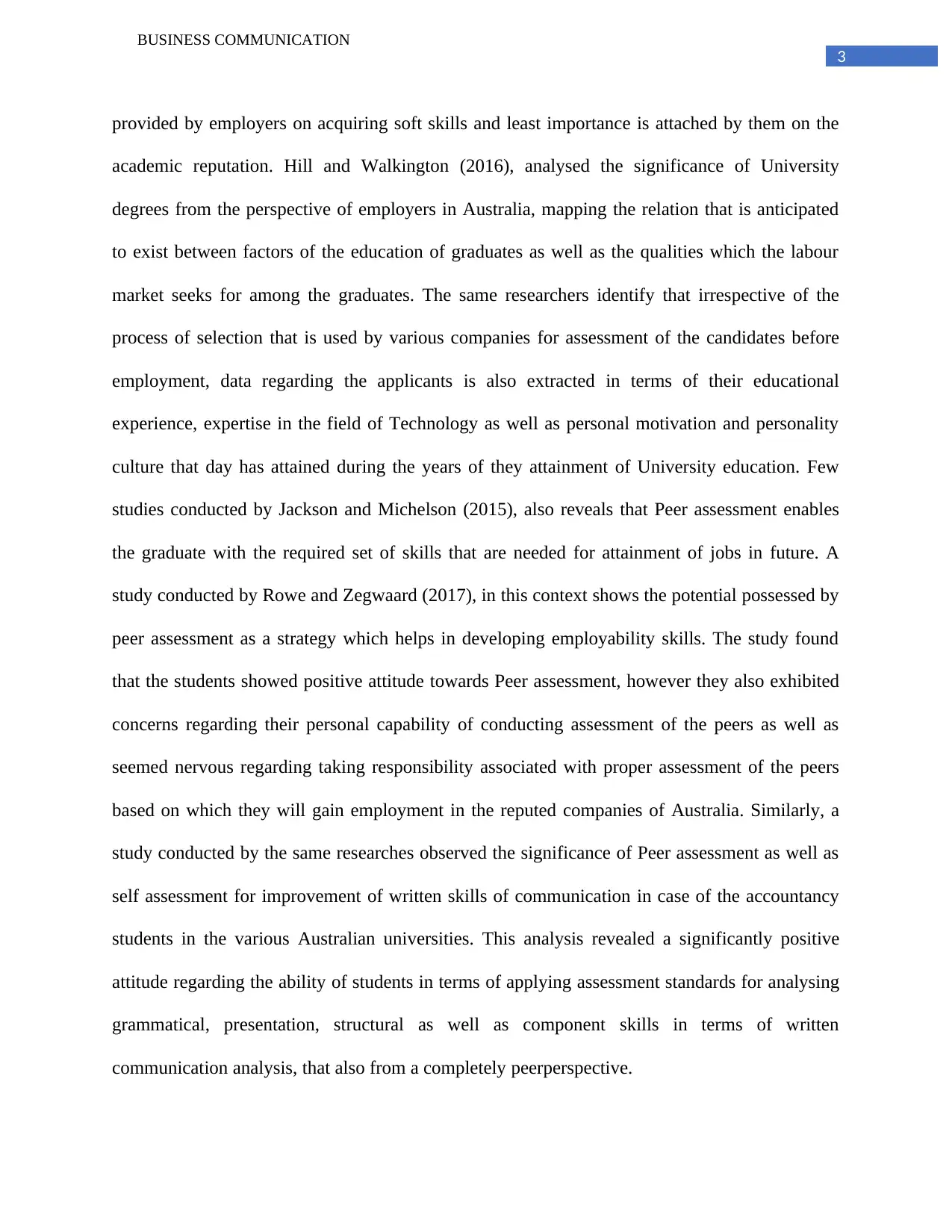
3
BUSINESS COMMUNICATION
provided by employers on acquiring soft skills and least importance is attached by them on the
academic reputation. Hill and Walkington (2016), analysed the significance of University
degrees from the perspective of employers in Australia, mapping the relation that is anticipated
to exist between factors of the education of graduates as well as the qualities which the labour
market seeks for among the graduates. The same researchers identify that irrespective of the
process of selection that is used by various companies for assessment of the candidates before
employment, data regarding the applicants is also extracted in terms of their educational
experience, expertise in the field of Technology as well as personal motivation and personality
culture that day has attained during the years of they attainment of University education. Few
studies conducted by Jackson and Michelson (2015), also reveals that Peer assessment enables
the graduate with the required set of skills that are needed for attainment of jobs in future. A
study conducted by Rowe and Zegwaard (2017), in this context shows the potential possessed by
peer assessment as a strategy which helps in developing employability skills. The study found
that the students showed positive attitude towards Peer assessment, however they also exhibited
concerns regarding their personal capability of conducting assessment of the peers as well as
seemed nervous regarding taking responsibility associated with proper assessment of the peers
based on which they will gain employment in the reputed companies of Australia. Similarly, a
study conducted by the same researches observed the significance of Peer assessment as well as
self assessment for improvement of written skills of communication in case of the accountancy
students in the various Australian universities. This analysis revealed a significantly positive
attitude regarding the ability of students in terms of applying assessment standards for analysing
grammatical, presentation, structural as well as component skills in terms of written
communication analysis, that also from a completely peerperspective.
BUSINESS COMMUNICATION
provided by employers on acquiring soft skills and least importance is attached by them on the
academic reputation. Hill and Walkington (2016), analysed the significance of University
degrees from the perspective of employers in Australia, mapping the relation that is anticipated
to exist between factors of the education of graduates as well as the qualities which the labour
market seeks for among the graduates. The same researchers identify that irrespective of the
process of selection that is used by various companies for assessment of the candidates before
employment, data regarding the applicants is also extracted in terms of their educational
experience, expertise in the field of Technology as well as personal motivation and personality
culture that day has attained during the years of they attainment of University education. Few
studies conducted by Jackson and Michelson (2015), also reveals that Peer assessment enables
the graduate with the required set of skills that are needed for attainment of jobs in future. A
study conducted by Rowe and Zegwaard (2017), in this context shows the potential possessed by
peer assessment as a strategy which helps in developing employability skills. The study found
that the students showed positive attitude towards Peer assessment, however they also exhibited
concerns regarding their personal capability of conducting assessment of the peers as well as
seemed nervous regarding taking responsibility associated with proper assessment of the peers
based on which they will gain employment in the reputed companies of Australia. Similarly, a
study conducted by the same researches observed the significance of Peer assessment as well as
self assessment for improvement of written skills of communication in case of the accountancy
students in the various Australian universities. This analysis revealed a significantly positive
attitude regarding the ability of students in terms of applying assessment standards for analysing
grammatical, presentation, structural as well as component skills in terms of written
communication analysis, that also from a completely peerperspective.
⊘ This is a preview!⊘
Do you want full access?
Subscribe today to unlock all pages.

Trusted by 1+ million students worldwide
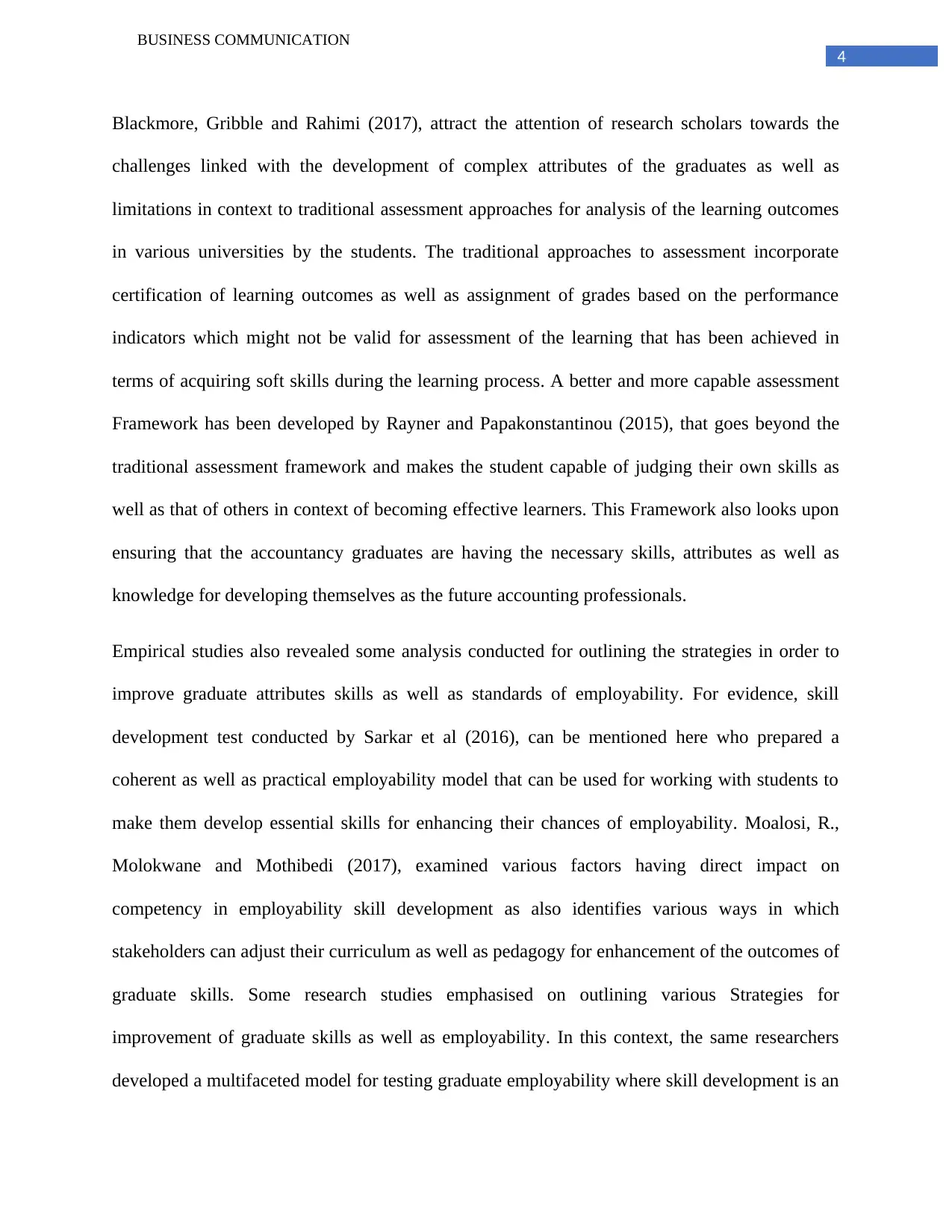
4
BUSINESS COMMUNICATION
Blackmore, Gribble and Rahimi (2017), attract the attention of research scholars towards the
challenges linked with the development of complex attributes of the graduates as well as
limitations in context to traditional assessment approaches for analysis of the learning outcomes
in various universities by the students. The traditional approaches to assessment incorporate
certification of learning outcomes as well as assignment of grades based on the performance
indicators which might not be valid for assessment of the learning that has been achieved in
terms of acquiring soft skills during the learning process. A better and more capable assessment
Framework has been developed by Rayner and Papakonstantinou (2015), that goes beyond the
traditional assessment framework and makes the student capable of judging their own skills as
well as that of others in context of becoming effective learners. This Framework also looks upon
ensuring that the accountancy graduates are having the necessary skills, attributes as well as
knowledge for developing themselves as the future accounting professionals.
Empirical studies also revealed some analysis conducted for outlining the strategies in order to
improve graduate attributes skills as well as standards of employability. For evidence, skill
development test conducted by Sarkar et al (2016), can be mentioned here who prepared a
coherent as well as practical employability model that can be used for working with students to
make them develop essential skills for enhancing their chances of employability. Moalosi, R.,
Molokwane and Mothibedi (2017), examined various factors having direct impact on
competency in employability skill development as also identifies various ways in which
stakeholders can adjust their curriculum as well as pedagogy for enhancement of the outcomes of
graduate skills. Some research studies emphasised on outlining various Strategies for
improvement of graduate skills as well as employability. In this context, the same researchers
developed a multifaceted model for testing graduate employability where skill development is an
BUSINESS COMMUNICATION
Blackmore, Gribble and Rahimi (2017), attract the attention of research scholars towards the
challenges linked with the development of complex attributes of the graduates as well as
limitations in context to traditional assessment approaches for analysis of the learning outcomes
in various universities by the students. The traditional approaches to assessment incorporate
certification of learning outcomes as well as assignment of grades based on the performance
indicators which might not be valid for assessment of the learning that has been achieved in
terms of acquiring soft skills during the learning process. A better and more capable assessment
Framework has been developed by Rayner and Papakonstantinou (2015), that goes beyond the
traditional assessment framework and makes the student capable of judging their own skills as
well as that of others in context of becoming effective learners. This Framework also looks upon
ensuring that the accountancy graduates are having the necessary skills, attributes as well as
knowledge for developing themselves as the future accounting professionals.
Empirical studies also revealed some analysis conducted for outlining the strategies in order to
improve graduate attributes skills as well as standards of employability. For evidence, skill
development test conducted by Sarkar et al (2016), can be mentioned here who prepared a
coherent as well as practical employability model that can be used for working with students to
make them develop essential skills for enhancing their chances of employability. Moalosi, R.,
Molokwane and Mothibedi (2017), examined various factors having direct impact on
competency in employability skill development as also identifies various ways in which
stakeholders can adjust their curriculum as well as pedagogy for enhancement of the outcomes of
graduate skills. Some research studies emphasised on outlining various Strategies for
improvement of graduate skills as well as employability. In this context, the same researchers
developed a multifaceted model for testing graduate employability where skill development is an
Paraphrase This Document
Need a fresh take? Get an instant paraphrase of this document with our AI Paraphraser
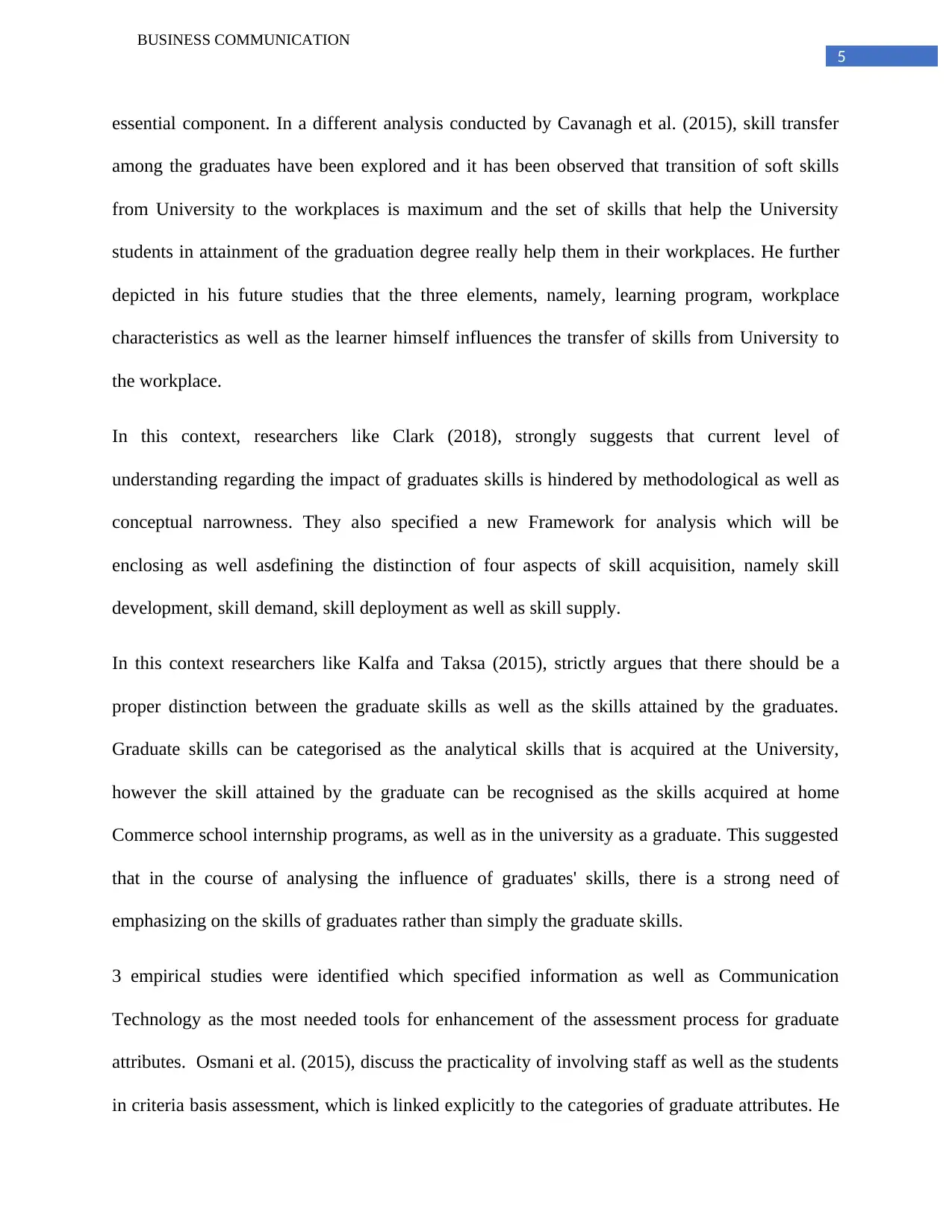
5
BUSINESS COMMUNICATION
essential component. In a different analysis conducted by Cavanagh et al. (2015), skill transfer
among the graduates have been explored and it has been observed that transition of soft skills
from University to the workplaces is maximum and the set of skills that help the University
students in attainment of the graduation degree really help them in their workplaces. He further
depicted in his future studies that the three elements, namely, learning program, workplace
characteristics as well as the learner himself influences the transfer of skills from University to
the workplace.
In this context, researchers like Clark (2018), strongly suggests that current level of
understanding regarding the impact of graduates skills is hindered by methodological as well as
conceptual narrowness. They also specified a new Framework for analysis which will be
enclosing as well asdefining the distinction of four aspects of skill acquisition, namely skill
development, skill demand, skill deployment as well as skill supply.
In this context researchers like Kalfa and Taksa (2015), strictly argues that there should be a
proper distinction between the graduate skills as well as the skills attained by the graduates.
Graduate skills can be categorised as the analytical skills that is acquired at the University,
however the skill attained by the graduate can be recognised as the skills acquired at home
Commerce school internship programs, as well as in the university as a graduate. This suggested
that in the course of analysing the influence of graduates' skills, there is a strong need of
emphasizing on the skills of graduates rather than simply the graduate skills.
3 empirical studies were identified which specified information as well as Communication
Technology as the most needed tools for enhancement of the assessment process for graduate
attributes. Osmani et al. (2015), discuss the practicality of involving staff as well as the students
in criteria basis assessment, which is linked explicitly to the categories of graduate attributes. He
BUSINESS COMMUNICATION
essential component. In a different analysis conducted by Cavanagh et al. (2015), skill transfer
among the graduates have been explored and it has been observed that transition of soft skills
from University to the workplaces is maximum and the set of skills that help the University
students in attainment of the graduation degree really help them in their workplaces. He further
depicted in his future studies that the three elements, namely, learning program, workplace
characteristics as well as the learner himself influences the transfer of skills from University to
the workplace.
In this context, researchers like Clark (2018), strongly suggests that current level of
understanding regarding the impact of graduates skills is hindered by methodological as well as
conceptual narrowness. They also specified a new Framework for analysis which will be
enclosing as well asdefining the distinction of four aspects of skill acquisition, namely skill
development, skill demand, skill deployment as well as skill supply.
In this context researchers like Kalfa and Taksa (2015), strictly argues that there should be a
proper distinction between the graduate skills as well as the skills attained by the graduates.
Graduate skills can be categorised as the analytical skills that is acquired at the University,
however the skill attained by the graduate can be recognised as the skills acquired at home
Commerce school internship programs, as well as in the university as a graduate. This suggested
that in the course of analysing the influence of graduates' skills, there is a strong need of
emphasizing on the skills of graduates rather than simply the graduate skills.
3 empirical studies were identified which specified information as well as Communication
Technology as the most needed tools for enhancement of the assessment process for graduate
attributes. Osmani et al. (2015), discuss the practicality of involving staff as well as the students
in criteria basis assessment, which is linked explicitly to the categories of graduate attributes. He
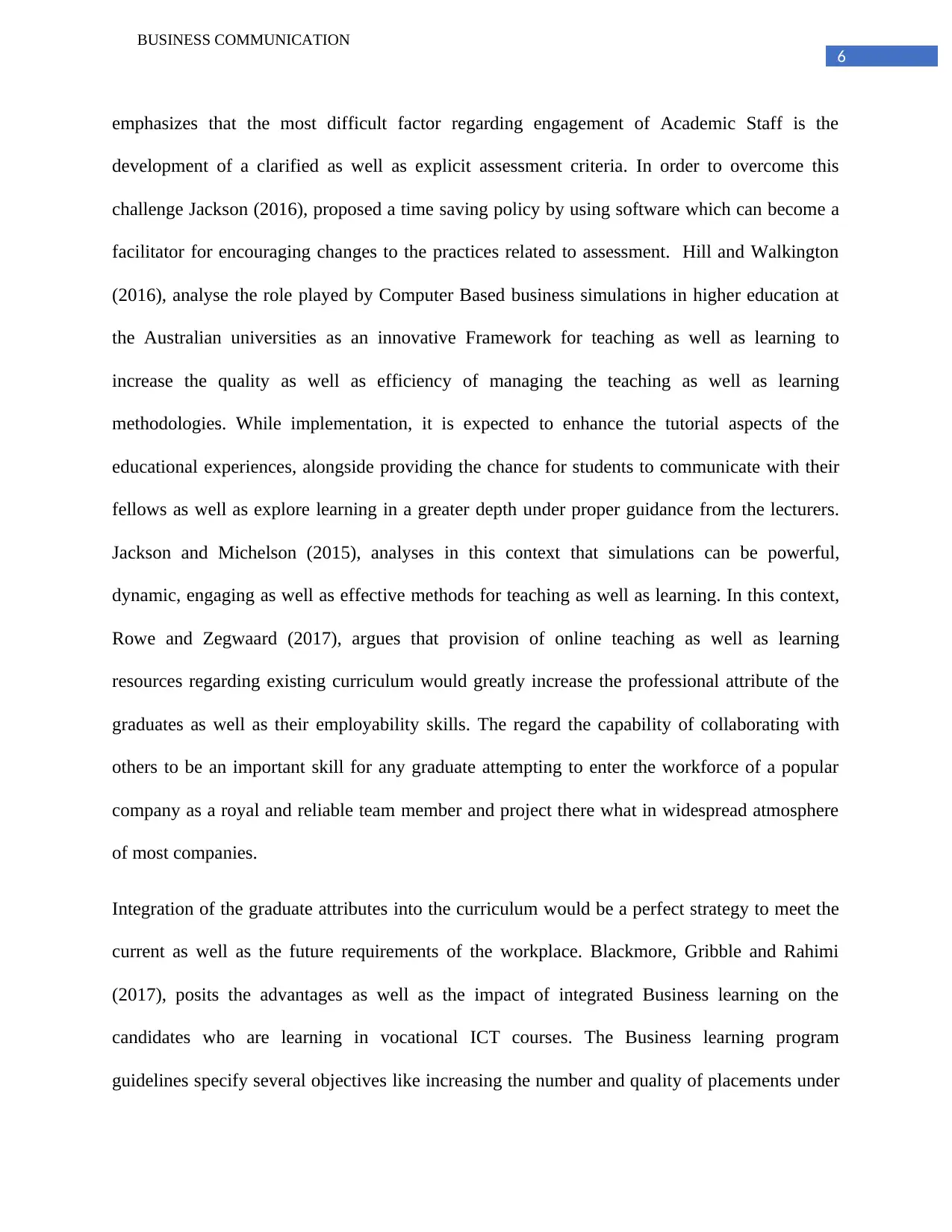
6
BUSINESS COMMUNICATION
emphasizes that the most difficult factor regarding engagement of Academic Staff is the
development of a clarified as well as explicit assessment criteria. In order to overcome this
challenge Jackson (2016), proposed a time saving policy by using software which can become a
facilitator for encouraging changes to the practices related to assessment. Hill and Walkington
(2016), analyse the role played by Computer Based business simulations in higher education at
the Australian universities as an innovative Framework for teaching as well as learning to
increase the quality as well as efficiency of managing the teaching as well as learning
methodologies. While implementation, it is expected to enhance the tutorial aspects of the
educational experiences, alongside providing the chance for students to communicate with their
fellows as well as explore learning in a greater depth under proper guidance from the lecturers.
Jackson and Michelson (2015), analyses in this context that simulations can be powerful,
dynamic, engaging as well as effective methods for teaching as well as learning. In this context,
Rowe and Zegwaard (2017), argues that provision of online teaching as well as learning
resources regarding existing curriculum would greatly increase the professional attribute of the
graduates as well as their employability skills. The regard the capability of collaborating with
others to be an important skill for any graduate attempting to enter the workforce of a popular
company as a royal and reliable team member and project there what in widespread atmosphere
of most companies.
Integration of the graduate attributes into the curriculum would be a perfect strategy to meet the
current as well as the future requirements of the workplace. Blackmore, Gribble and Rahimi
(2017), posits the advantages as well as the impact of integrated Business learning on the
candidates who are learning in vocational ICT courses. The Business learning program
guidelines specify several objectives like increasing the number and quality of placements under
BUSINESS COMMUNICATION
emphasizes that the most difficult factor regarding engagement of Academic Staff is the
development of a clarified as well as explicit assessment criteria. In order to overcome this
challenge Jackson (2016), proposed a time saving policy by using software which can become a
facilitator for encouraging changes to the practices related to assessment. Hill and Walkington
(2016), analyse the role played by Computer Based business simulations in higher education at
the Australian universities as an innovative Framework for teaching as well as learning to
increase the quality as well as efficiency of managing the teaching as well as learning
methodologies. While implementation, it is expected to enhance the tutorial aspects of the
educational experiences, alongside providing the chance for students to communicate with their
fellows as well as explore learning in a greater depth under proper guidance from the lecturers.
Jackson and Michelson (2015), analyses in this context that simulations can be powerful,
dynamic, engaging as well as effective methods for teaching as well as learning. In this context,
Rowe and Zegwaard (2017), argues that provision of online teaching as well as learning
resources regarding existing curriculum would greatly increase the professional attribute of the
graduates as well as their employability skills. The regard the capability of collaborating with
others to be an important skill for any graduate attempting to enter the workforce of a popular
company as a royal and reliable team member and project there what in widespread atmosphere
of most companies.
Integration of the graduate attributes into the curriculum would be a perfect strategy to meet the
current as well as the future requirements of the workplace. Blackmore, Gribble and Rahimi
(2017), posits the advantages as well as the impact of integrated Business learning on the
candidates who are learning in vocational ICT courses. The Business learning program
guidelines specify several objectives like increasing the number and quality of placements under
⊘ This is a preview!⊘
Do you want full access?
Subscribe today to unlock all pages.

Trusted by 1+ million students worldwide
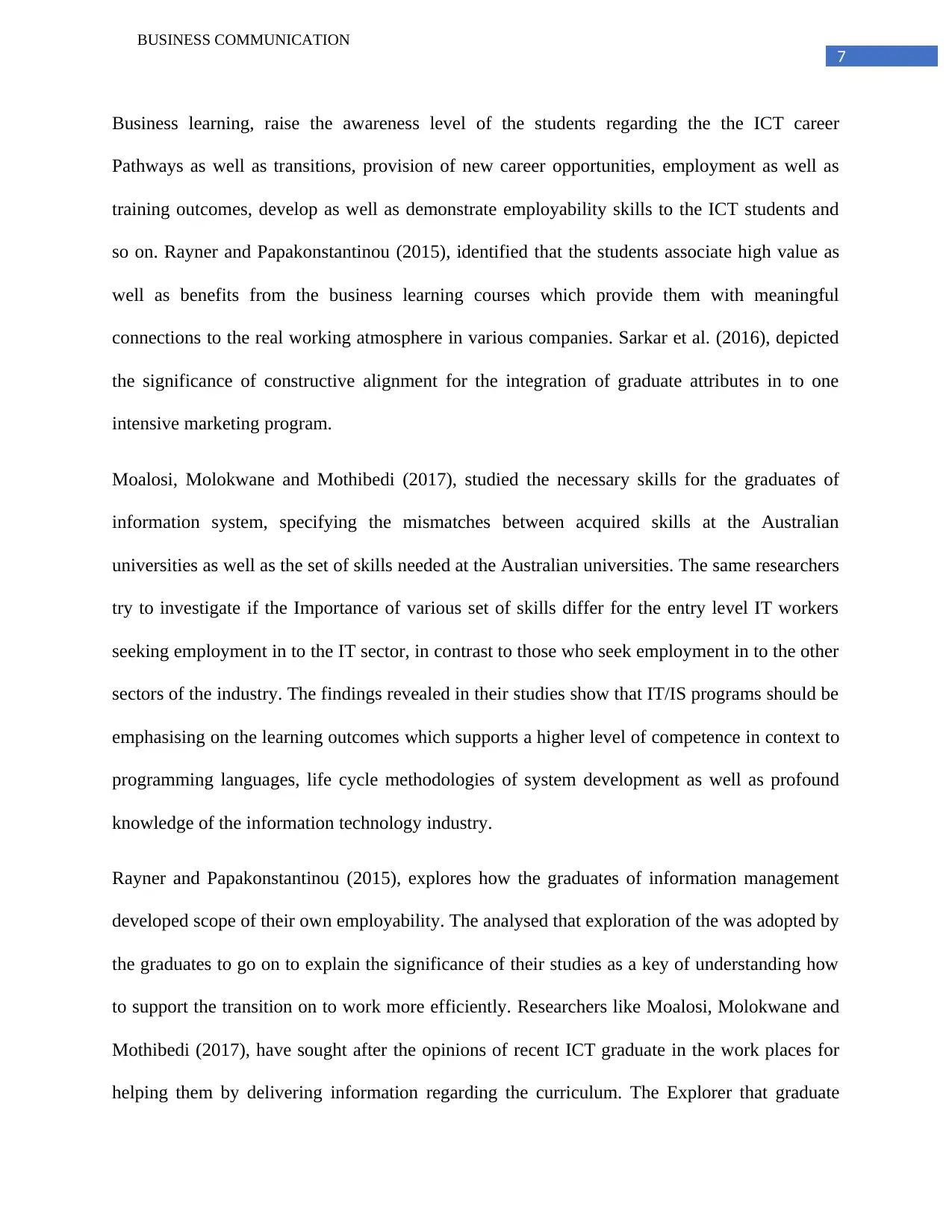
7
BUSINESS COMMUNICATION
Business learning, raise the awareness level of the students regarding the the ICT career
Pathways as well as transitions, provision of new career opportunities, employment as well as
training outcomes, develop as well as demonstrate employability skills to the ICT students and
so on. Rayner and Papakonstantinou (2015), identified that the students associate high value as
well as benefits from the business learning courses which provide them with meaningful
connections to the real working atmosphere in various companies. Sarkar et al. (2016), depicted
the significance of constructive alignment for the integration of graduate attributes in to one
intensive marketing program.
Moalosi, Molokwane and Mothibedi (2017), studied the necessary skills for the graduates of
information system, specifying the mismatches between acquired skills at the Australian
universities as well as the set of skills needed at the Australian universities. The same researchers
try to investigate if the Importance of various set of skills differ for the entry level IT workers
seeking employment in to the IT sector, in contrast to those who seek employment in to the other
sectors of the industry. The findings revealed in their studies show that IT/IS programs should be
emphasising on the learning outcomes which supports a higher level of competence in context to
programming languages, life cycle methodologies of system development as well as profound
knowledge of the information technology industry.
Rayner and Papakonstantinou (2015), explores how the graduates of information management
developed scope of their own employability. The analysed that exploration of the was adopted by
the graduates to go on to explain the significance of their studies as a key of understanding how
to support the transition on to work more efficiently. Researchers like Moalosi, Molokwane and
Mothibedi (2017), have sought after the opinions of recent ICT graduate in the work places for
helping them by delivering information regarding the curriculum. The Explorer that graduate
BUSINESS COMMUNICATION
Business learning, raise the awareness level of the students regarding the the ICT career
Pathways as well as transitions, provision of new career opportunities, employment as well as
training outcomes, develop as well as demonstrate employability skills to the ICT students and
so on. Rayner and Papakonstantinou (2015), identified that the students associate high value as
well as benefits from the business learning courses which provide them with meaningful
connections to the real working atmosphere in various companies. Sarkar et al. (2016), depicted
the significance of constructive alignment for the integration of graduate attributes in to one
intensive marketing program.
Moalosi, Molokwane and Mothibedi (2017), studied the necessary skills for the graduates of
information system, specifying the mismatches between acquired skills at the Australian
universities as well as the set of skills needed at the Australian universities. The same researchers
try to investigate if the Importance of various set of skills differ for the entry level IT workers
seeking employment in to the IT sector, in contrast to those who seek employment in to the other
sectors of the industry. The findings revealed in their studies show that IT/IS programs should be
emphasising on the learning outcomes which supports a higher level of competence in context to
programming languages, life cycle methodologies of system development as well as profound
knowledge of the information technology industry.
Rayner and Papakonstantinou (2015), explores how the graduates of information management
developed scope of their own employability. The analysed that exploration of the was adopted by
the graduates to go on to explain the significance of their studies as a key of understanding how
to support the transition on to work more efficiently. Researchers like Moalosi, Molokwane and
Mothibedi (2017), have sought after the opinions of recent ICT graduate in the work places for
helping them by delivering information regarding the curriculum. The Explorer that graduate
Paraphrase This Document
Need a fresh take? Get an instant paraphrase of this document with our AI Paraphraser
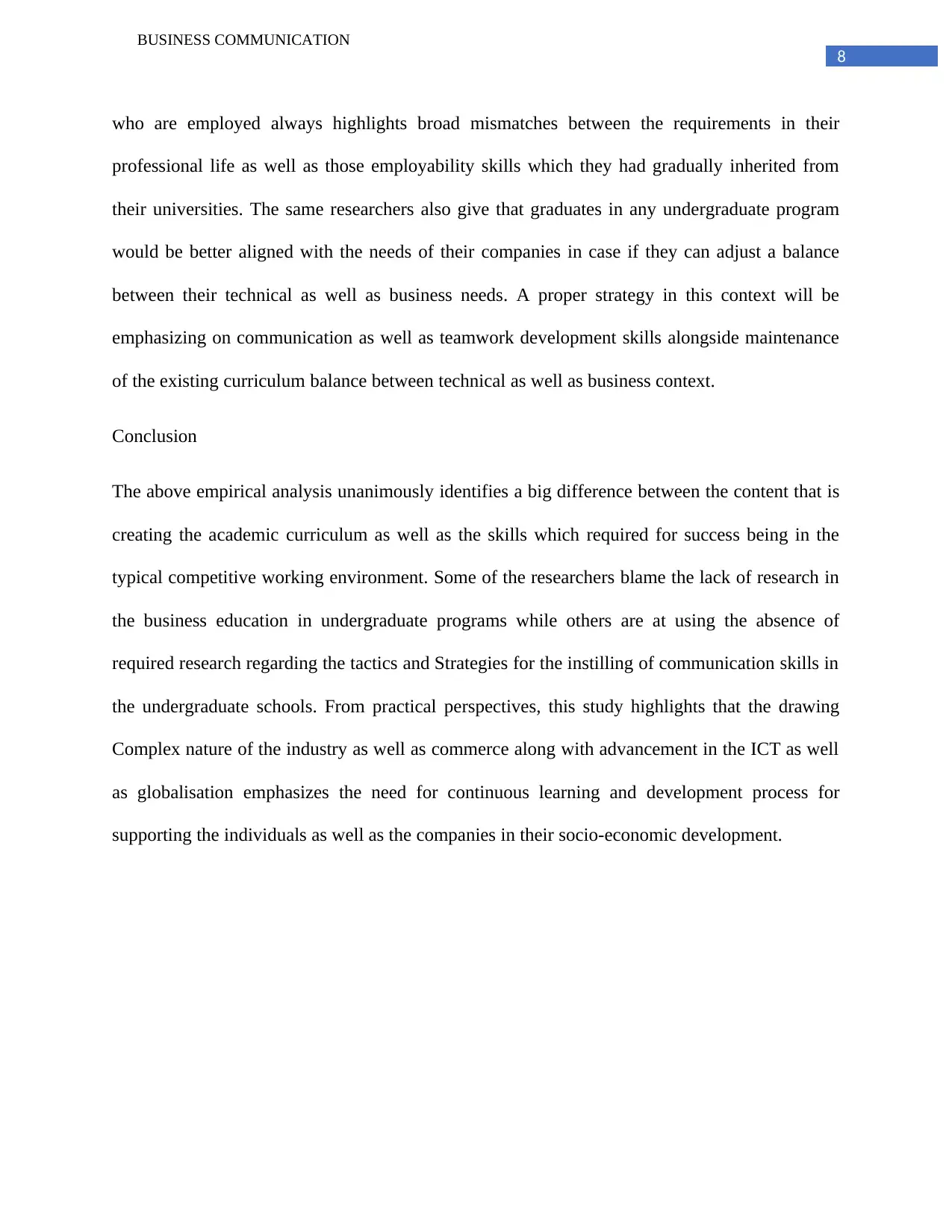
8
BUSINESS COMMUNICATION
who are employed always highlights broad mismatches between the requirements in their
professional life as well as those employability skills which they had gradually inherited from
their universities. The same researchers also give that graduates in any undergraduate program
would be better aligned with the needs of their companies in case if they can adjust a balance
between their technical as well as business needs. A proper strategy in this context will be
emphasizing on communication as well as teamwork development skills alongside maintenance
of the existing curriculum balance between technical as well as business context.
Conclusion
The above empirical analysis unanimously identifies a big difference between the content that is
creating the academic curriculum as well as the skills which required for success being in the
typical competitive working environment. Some of the researchers blame the lack of research in
the business education in undergraduate programs while others are at using the absence of
required research regarding the tactics and Strategies for the instilling of communication skills in
the undergraduate schools. From practical perspectives, this study highlights that the drawing
Complex nature of the industry as well as commerce along with advancement in the ICT as well
as globalisation emphasizes the need for continuous learning and development process for
supporting the individuals as well as the companies in their socio-economic development.
BUSINESS COMMUNICATION
who are employed always highlights broad mismatches between the requirements in their
professional life as well as those employability skills which they had gradually inherited from
their universities. The same researchers also give that graduates in any undergraduate program
would be better aligned with the needs of their companies in case if they can adjust a balance
between their technical as well as business needs. A proper strategy in this context will be
emphasizing on communication as well as teamwork development skills alongside maintenance
of the existing curriculum balance between technical as well as business context.
Conclusion
The above empirical analysis unanimously identifies a big difference between the content that is
creating the academic curriculum as well as the skills which required for success being in the
typical competitive working environment. Some of the researchers blame the lack of research in
the business education in undergraduate programs while others are at using the absence of
required research regarding the tactics and Strategies for the instilling of communication skills in
the undergraduate schools. From practical perspectives, this study highlights that the drawing
Complex nature of the industry as well as commerce along with advancement in the ICT as well
as globalisation emphasizes the need for continuous learning and development process for
supporting the individuals as well as the companies in their socio-economic development.
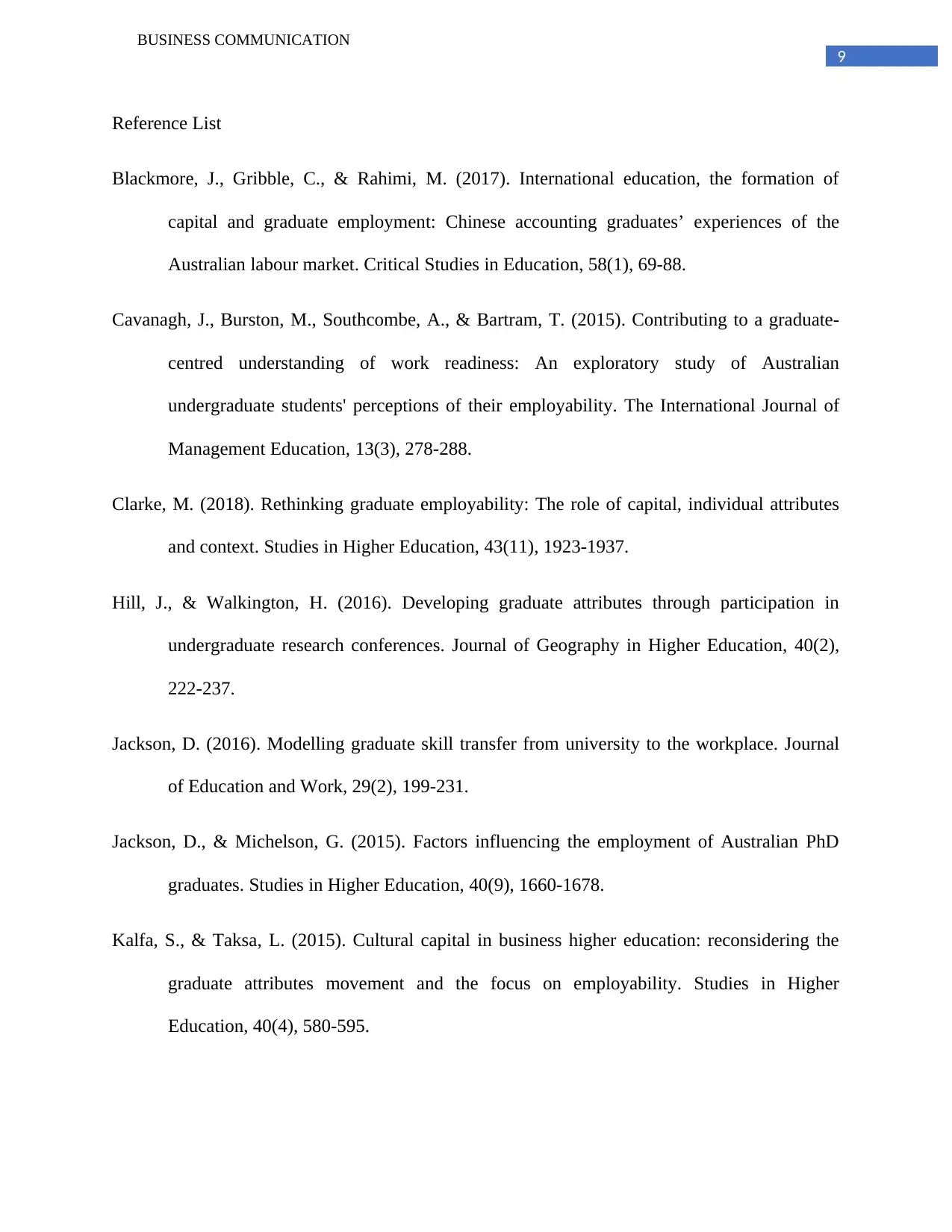
9
BUSINESS COMMUNICATION
Reference List
Blackmore, J., Gribble, C., & Rahimi, M. (2017). International education, the formation of
capital and graduate employment: Chinese accounting graduates’ experiences of the
Australian labour market. Critical Studies in Education, 58(1), 69-88.
Cavanagh, J., Burston, M., Southcombe, A., & Bartram, T. (2015). Contributing to a graduate-
centred understanding of work readiness: An exploratory study of Australian
undergraduate students' perceptions of their employability. The International Journal of
Management Education, 13(3), 278-288.
Clarke, M. (2018). Rethinking graduate employability: The role of capital, individual attributes
and context. Studies in Higher Education, 43(11), 1923-1937.
Hill, J., & Walkington, H. (2016). Developing graduate attributes through participation in
undergraduate research conferences. Journal of Geography in Higher Education, 40(2),
222-237.
Jackson, D. (2016). Modelling graduate skill transfer from university to the workplace. Journal
of Education and Work, 29(2), 199-231.
Jackson, D., & Michelson, G. (2015). Factors influencing the employment of Australian PhD
graduates. Studies in Higher Education, 40(9), 1660-1678.
Kalfa, S., & Taksa, L. (2015). Cultural capital in business higher education: reconsidering the
graduate attributes movement and the focus on employability. Studies in Higher
Education, 40(4), 580-595.
BUSINESS COMMUNICATION
Reference List
Blackmore, J., Gribble, C., & Rahimi, M. (2017). International education, the formation of
capital and graduate employment: Chinese accounting graduates’ experiences of the
Australian labour market. Critical Studies in Education, 58(1), 69-88.
Cavanagh, J., Burston, M., Southcombe, A., & Bartram, T. (2015). Contributing to a graduate-
centred understanding of work readiness: An exploratory study of Australian
undergraduate students' perceptions of their employability. The International Journal of
Management Education, 13(3), 278-288.
Clarke, M. (2018). Rethinking graduate employability: The role of capital, individual attributes
and context. Studies in Higher Education, 43(11), 1923-1937.
Hill, J., & Walkington, H. (2016). Developing graduate attributes through participation in
undergraduate research conferences. Journal of Geography in Higher Education, 40(2),
222-237.
Jackson, D. (2016). Modelling graduate skill transfer from university to the workplace. Journal
of Education and Work, 29(2), 199-231.
Jackson, D., & Michelson, G. (2015). Factors influencing the employment of Australian PhD
graduates. Studies in Higher Education, 40(9), 1660-1678.
Kalfa, S., & Taksa, L. (2015). Cultural capital in business higher education: reconsidering the
graduate attributes movement and the focus on employability. Studies in Higher
Education, 40(4), 580-595.
⊘ This is a preview!⊘
Do you want full access?
Subscribe today to unlock all pages.

Trusted by 1+ million students worldwide
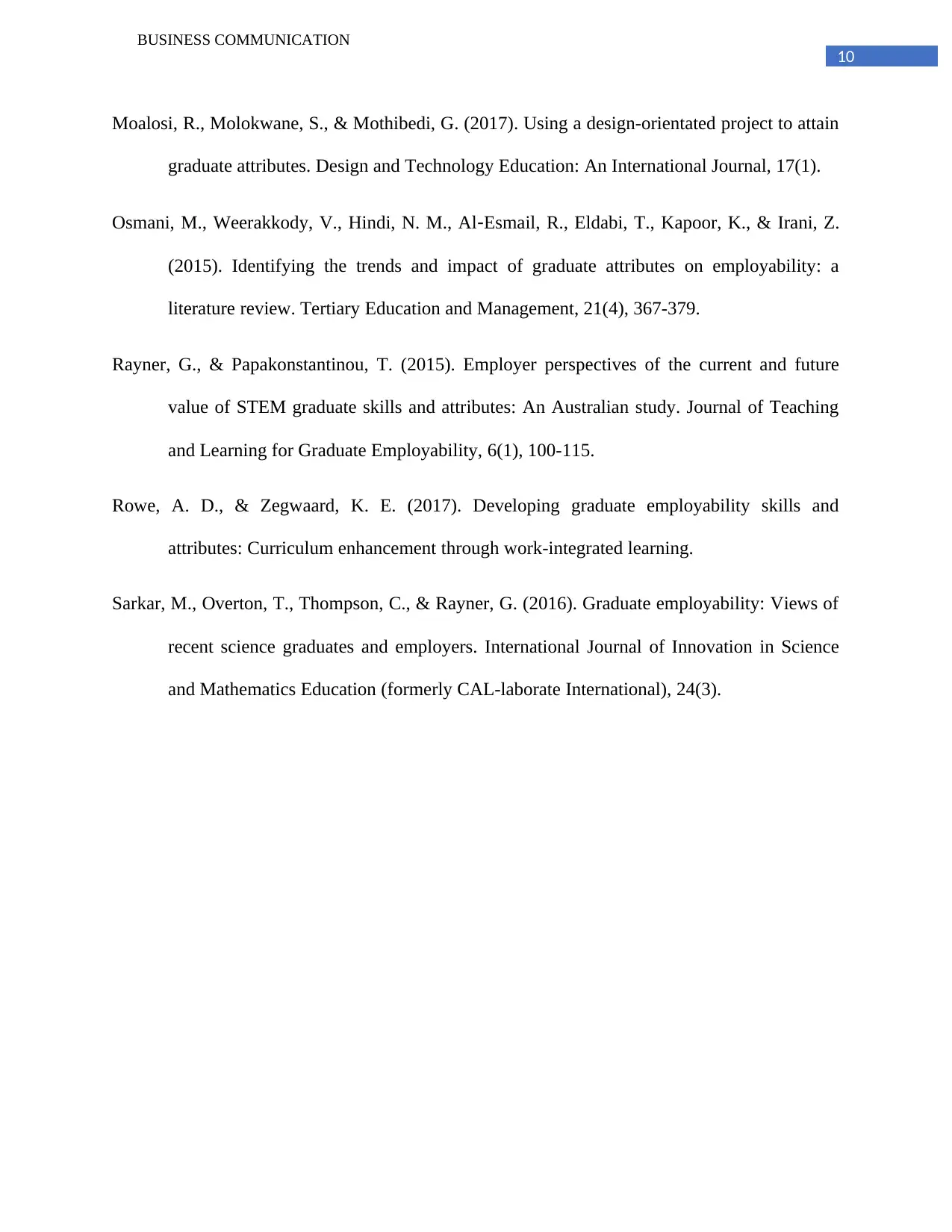
10
BUSINESS COMMUNICATION
Moalosi, R., Molokwane, S., & Mothibedi, G. (2017). Using a design-orientated project to attain
graduate attributes. Design and Technology Education: An International Journal, 17(1).
Osmani, M., Weerakkody, V., Hindi, N. M., Al‐Esmail, R., Eldabi, T., Kapoor, K., & Irani, Z.
(2015). Identifying the trends and impact of graduate attributes on employability: a
literature review. Tertiary Education and Management, 21(4), 367-379.
Rayner, G., & Papakonstantinou, T. (2015). Employer perspectives of the current and future
value of STEM graduate skills and attributes: An Australian study. Journal of Teaching
and Learning for Graduate Employability, 6(1), 100-115.
Rowe, A. D., & Zegwaard, K. E. (2017). Developing graduate employability skills and
attributes: Curriculum enhancement through work-integrated learning.
Sarkar, M., Overton, T., Thompson, C., & Rayner, G. (2016). Graduate employability: Views of
recent science graduates and employers. International Journal of Innovation in Science
and Mathematics Education (formerly CAL-laborate International), 24(3).
BUSINESS COMMUNICATION
Moalosi, R., Molokwane, S., & Mothibedi, G. (2017). Using a design-orientated project to attain
graduate attributes. Design and Technology Education: An International Journal, 17(1).
Osmani, M., Weerakkody, V., Hindi, N. M., Al‐Esmail, R., Eldabi, T., Kapoor, K., & Irani, Z.
(2015). Identifying the trends and impact of graduate attributes on employability: a
literature review. Tertiary Education and Management, 21(4), 367-379.
Rayner, G., & Papakonstantinou, T. (2015). Employer perspectives of the current and future
value of STEM graduate skills and attributes: An Australian study. Journal of Teaching
and Learning for Graduate Employability, 6(1), 100-115.
Rowe, A. D., & Zegwaard, K. E. (2017). Developing graduate employability skills and
attributes: Curriculum enhancement through work-integrated learning.
Sarkar, M., Overton, T., Thompson, C., & Rayner, G. (2016). Graduate employability: Views of
recent science graduates and employers. International Journal of Innovation in Science
and Mathematics Education (formerly CAL-laborate International), 24(3).
1 out of 10
Related Documents
Your All-in-One AI-Powered Toolkit for Academic Success.
+13062052269
info@desklib.com
Available 24*7 on WhatsApp / Email
![[object Object]](/_next/static/media/star-bottom.7253800d.svg)
Unlock your academic potential
Copyright © 2020–2025 A2Z Services. All Rights Reserved. Developed and managed by ZUCOL.





